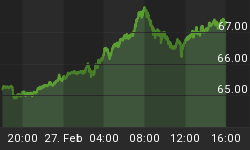The Dow Industrials have declined sharply eleven out of the past twelve Autumns, from 1997 through 2008, and it is setting up to do so again in 2009. Only 2006 failed to see a significant autumn decline.
Seven of the eleven declines were stock market crashes, with declines greater than 15 percent, and an eighth was nearly a crash, plunging 13.2 percent! The smallest decline of the eleven was still a significant 4.7 percent.
The declines typically started in the July to September period and lasted into the September to November period. Ten of the eleven significant declines were occurring over the autumn equinox, and all but one declined during the month of September.
Here's the data:
1997: A stock market crash that began on August 7th at 8,340.14 and fell for 57 days to a low of 6,936.45 on October 28th, a 1,403.69 drop, or 16.8 percent.
1998: A stock market crash that began on July 17th at 9,412.64 and fell for 32 trading days to a low of 7,329.70 on September 1st, a 2,032.94 plunge, or 21.6 percent. It hung around that low through October 8th, hitting a bottom that day at 7,399.78.
1999: A near-crash that began on August 25th at 11,428.94 and lasted through October 15th when it fell to 9,911.42, 36 trading days, a 13.2 percent sell-off.

2000: Another stock market crash, this one commencing September 6th at 11,401.19 and lasting until October 18th's 9,656.12 bottom, a 30 trading day plunge that saw prices fall 1,745.07 points, or 15.3 percent.
2001: Again, a stock market crash. It began on August 27th at 10,441.37 and lasted through September 21st, bottoming at 8,062.34, a 2,379.03, 22.7 percent bloodbath that took only 14 trading days.
2002: Again, the sixth stock market crash in a row if you consider the 13.2 percent 1999 wipeout a crash. It started innocently enough on August 22nd, at 9,077.01, and lasted until October 10th at 7,197.49. When the carnage was over, the losses were 1,879.52 points, or 20.7 percent.
2003: Even in 2003, when a glorious rally was in full swing, the Dow paused to follow tradition by dropping a measurable 4.7 percent, or 455.61 points from 9,686.08 on September 19th to 9,230.47 on September 30th.
2004: A significant 6.2 percent drop followed suit, markets in the tank from September 13th's 10,348.39 high to October 25th's 9,708.40 low, a 639.99 sell-off.
2005: A significant 5.8 percent drop followed the August 10th, 2005 top from 10,719.41 to October 13th, 2005's low of 10,098.18.

2006: This is the only year out of the past eleven where stocks did not experience a significant autumn decline.
2007: The current Grand Supercycle Bear Market started from October 11th, 2007's all-time high in the Industrials of 14,279.96. A stock market crash followed over the next three months to the January 22nd, 2008 low of 11,508.74, a 19.4 percent plunge.
2008: A devastating stock market crash occurred from the August 11th, 2008 top of 11,933.55 to the November 21st, 2008 low of 7,392.27, an incredible 4,541.28 point, 38.1 percent crash.
So here we are in 2009, with a six month rally getting long in the tooth, one which has seen the Industrials rally 3,458.49, or 54 percent, meaning a top is more than due. We have huge Head & Shoulders top patterns showing up in major international markets, have an Elliott Wave count which is close to topping, and the autumn has arrived once again, so the odds are high that another sharp decline is coming sometime in the fourth quarter 2009, according to this autumn declines study of the past 12 years.

"Jesus said to them, "I am the bread of life; he who comes to Me
shall not hunger, and he who believes in Me shall never thirst.
For I have come down from heaven,
For this is the will of My Father, that everyone who beholds
the Son and believes in Him, may have eternal life;
and I Myself will raise him up on the last day."
John 6: 35, 38, 40
Check out our Fall Specials, good through Sunday, October 4th, including a fabulous 14 month offering, only $259, a little over $18 a month, or 2 years for only $459 at www.technicalindicatorindex.com. For a Free 30 Day Trial Subscription, go to www.technicalindicatorindex.com and click on the Free Trial button at the upper right of the home page.















